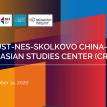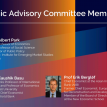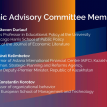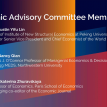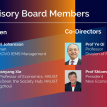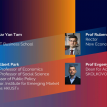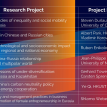On December 14, China-Russia Eurasian Studies Center (CREC) was launched by its co-founders - the Hong Kong University of Science and Technology (HKUST), the Hong Kong University of Science and Technology (Guangzhou) (HKUST (GZ)), the New Economic School (NES), and the Moscow School of Management-Skolkovo (Skolkovo). The center aims to become the world's leading research and education platform, focused on the relations and synergy potential between China, Russia and the rest of Eurasia.
CREC will attract the top international expertise to produce interdisciplinary research on contemporary technological, financial, political, social, economic and business development across Eurasia. The initial focus of its research outside Russia and China will be on Central Asia and the Caucasus. Numerous ongoing research projects of the center's participants on Eurasia will be continued under its auspices and will receive a new impetus.
CREC will also build a network of organizations to support development of education and training of new national and international leaders for the macroregion. Its outreach efforts will occur through the dissemination of research programs in Eurasian countries via seminars, training courses, and summer schools, targeting business, government sector, central banks and talented students from China, Russia, Central Asia, the Caucasus and beyond Eurasia.
The Center’s activities will take place mainly at HKUST (GZ), the capital of the southeastern province of Guangdong with a population of 110 million people and a GRP of about $1.5 tn per year, with considerable research activities in Moscow (14% of the population and 25% of Russia's GDP). The next stages of growth will expand the CREC to other Eurasian locations.
HKUST Professor Qi Ye and NES President, Professor Shlomo Weber will head the Center’s administrative structure as its two co-directors. They will report to the Supervisory Board, co-chaired by Carl Johansson, Institute for Emerging Markets Research, Moscow School of Management SKOLKOVO. The Academic Advisory Committee will be headed by HKUST Professor Albert Park, and include distinguished academics from Russia, China and Eurasia.
“Today, great changes are taking place in all areas of our life, and the Eurasian region is beginning to play an increasingly important role in the new multipolar world. CREC will not only analyze these changes, but also make measured yet decisive contributions to regional and international public policy debates, as well as leading and supporting business development. Members of the center already conduct research on income and social mobility, various aspects of international trade and investment, technological development, economic diversification and sustainable development in China, Russia, Kazakhstan and other countries of the Eurasian region," said NES President, Professor Shlomo Weber.


